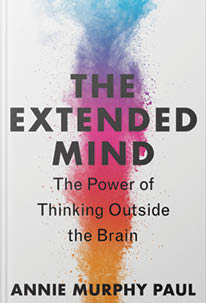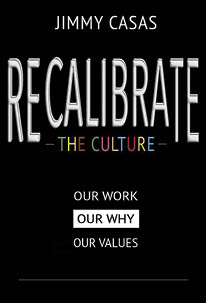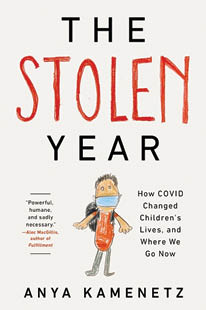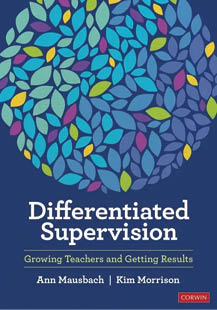Syllabus: February 2023
The Extended Mind: The Power of Thinking Outside the Brain

Is it possible to think beyond the limits of our brains? It’s a question that author Annie Murphy Paul addresses in The Extended Mind: The Power of Thinking Outside the Brain (Mariner Books). A longtime science writer, Murphy Paul examines multiple studies from neuroscience and cognitive science to unpack how we can improve our thinking and reach our full potential. School leaders will find the book useful for its insights around the very heart of education: human development. Those insights focus largely on what the author calls three types of cognition: “thinking with our bodies,” “thinking with our surroundings,” and “thinking with our relationships.” The first type encompasses an awareness of our bodies, which enables us to be more in tune with ourselves, thus opening new doors into learning thanks to sensations, movements, and gestures. The second type encompasses using resources found in both natural and built spaces, along with the space of ideas—the place in our minds where we offload all the facts that we have acquired to generate new knowledge. The third type centers on collaborating with experts, peers, and groups, to develop new concepts. Murphy Paul suggests the combination of all three creates “a curriculum of the extended mind,” providing us with the necessary tools to grow.
—Eric Basilo, EdD
Assistant Principal, Markham Woods Middle School, Lake Mary, FL
Recalibrate the Culture: Our Why, Our Work, Our Values

Author Jimmy Casas has successfully taken years of experience as a classroom teacher and campus leader and drawn from it to provide principles, processes, and protocols for recalibrating campus and classroom culture. In his book Recalibrate the Culture: Our Why, Our Work, Our Values (ConnectEDD), Casas writes that “a healthy culture assesses its current reality and envisions a new desired reality, and then comes together as a school community to reframe it and change their results by changing their responses and their behaviors.” To that end, he shares strategies designed to help school leaders create a district, campus, and classroom culture, which they can look forward to being a part of each day because they feel (and make others feel) connected, valued, appreciated, and inspired. Casas emphasizes the need for all educators to understand the role they each play in terms of impacting the climate and culture of an entire campus. This book will resonate with readers in need of a fresh point of reference and a newfound sense of hope and readiness to positively influence workplace morale.
—Mike Rumsey
Assistant Principal, Roxana Senior High School, Roxana, IL
The Stolen Year: How COVID Changed Children’s Lives, and Where We Go Now

In The Stolen Year: How COVID Changed Children’s Lives, and Where We Go Now (PublicAffairs), education journalist Anya Kamenetz shows how the pandemic, along with school closures and the politically fraught climate that came with it, hurt students in ways we are still tabulating. Kamenetz organizes her book chronologically, following the timeline of the pandemic itself. She notes just how foundational schools are to our country, writing that although the United States faces many challenges such as health care, childcare, affordable housing, and paid family leave, “we do have this beautiful phenomenon where in every neighborhood, in every city, town, and rural community in America, there is a warm, lighted building that children can go to for 180 days a year. There they will be safe, they will be fed, and they are likely to encounter a caring adult or two and maybe even learn something. All for free.” When schools closed, anxiety and depression skyrocketed, and learning was disrupted. To document all that ensued, Kamenetz highlights the experiences of several families throughout their pandemic journey. This book is an essential read for educators looking to review this turbulent time, and it shows us what must be done differently should we find ourselves in future crises.
—Brendy Siev
Assistant Principal, Kosloff Torah Academy, Bala Cynwyd, PA
Differentiated Supervision: Growing Teachers and Getting Results

Supervision supports student learning by helping teachers intentionally plan and grow their skills to meet the needs of learners. Evaluation is how successful supervision processes are measured. In Differentiated Supervision: Growing Teachers and Getting Results (Corwin Press), Ann Mausbach and Kim Morrison use a process of supervision that explains how frequent feedback is at the core of improving student learning. This process includes general and focused walkthroughs, implementation study, and use of defined district or state evaluation standards. Throughout the book, analogies to gardening provide relatable context for readers. The authors share specific, measurable tools and structures for helping school leaders create growth conditions to leverage human, social, and decisional capital. School improvement plans, which include cohesive plans for adult learning, infrastructure, and timing, are critical elements that the authors highlight. Ultimately, with the processes and tools described in this inspirational book, leaders can transform supervision into engaging, relevant, and timely conversations, leading to exceptional outcomes for all students.
—Susan C. Paul, EdD
Principal, Kaiserslautern Middle School, Germany, Department of Defense Education Activity
